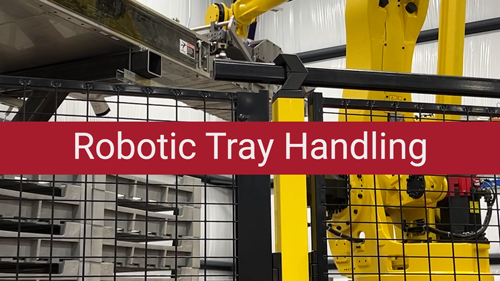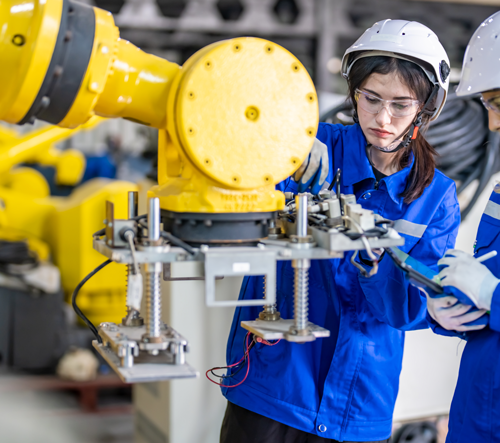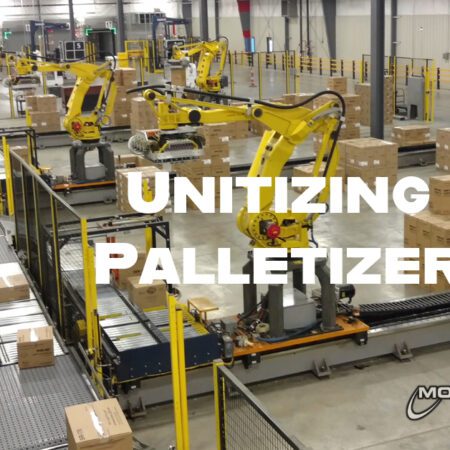Selecting a robot integrator can be a complicated decision. When deciding to add robotics to your process, there are usually multiple ways to accomplish the same process. Finding the company with the experience to implement the best, most efficient solution is the goal.
Motion Controls Robotics has been building their knowledge base since 1995. As a bonus, we are an Exclusive FANUC Level 4 Certified Servicing Integrator. We partnered with FANUC Robots, a global leader in automation and innovation, to provide you the most reliable, fastest and highest capacity robots on the market.
Motion Controls Robotics has defined a system of Robot Integration Services you receive when selecting MCRI for your integration project. Each of these robot integration services puts an important emphasis on a phase needed for providing you with a system that is not only efficient for today but expandable for the future.
Robot Integration Services include:
- Communication
- Safety
- Quality
- Project Management
- Design and Construction
- Programming, HMI Design and System Reliability
- System Installation and Commissioning
- System Maintenance and Support
Communication
MCRI considers effective two-way communications the single most important factor in successful project execution. We prefer that you participate in all scheduled design reviews and milestone meetings. We find it works best to assign a single person to act as the primary contact for handling design, pricing, work scope, and delivery issues.
Safety
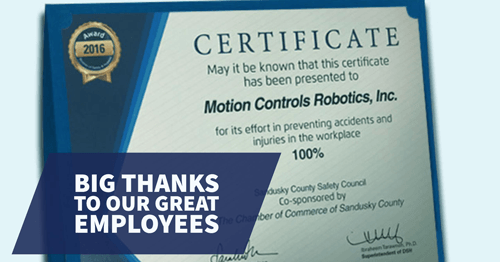
With 22 years without a loss time accident, MCRI’s safety record is outstanding both at our facility and installations in the field. Your robot system will have a safety system that follows concepts MCRI has used for many years as well as devices having relatively new technological advancements.
MCRI holds the Certified Integrator status with The Robotic Industries Association (RIA) and is an active RIA member. MCRI is experienced with the risk assessment process and can aid our end users to apply this process to the design and evaluation of the function and operation of the cell/system.
MCRI’s opinion is that the standards help robot manufacturers, other machine builders, system integrators and end users bring the world closer to global harmonization of robot safety standards.
Quality
MCRI is committed to delivering systems of unparalleled performance and quality. MCRI dedication to quality is evidenced by its high design standards and rigorous attention to detail in every phase of design, build, and installation. Standard processes build in quality assurance criteria ensuring that MCRI’s high level of quality is maintained throughout the various project phases.
Project Management
We use a project management process that covers the scope and dimensions involved to meet project goals. We define each stage of the process assigning stage goals and responsibilities for meeting the goals.
After order placement, the MCRI project manager will submit a project schedule with specific completion dates. Specifying each stage of the project:
- Initiation
- Planning
- Execution & Project Control
- Closing
You are assigned a single point of contact for questions and your company will receive regular progress reports.
Design & Construction
MCRI strives to create an industry-leading level of quality and performance. To do this, we follow well-established procedures for the design and construction of your equipment. During the design phase our diverse team of engineers, programmers, and fabricators work together with you and your regional sales manager to help build a solution for your process. During this stage we:
- Define system requirements
- Layout the system based on your facility specifications
- Build a simulation based on process
- Manage vendors and cost control
- Innovate machine design
- Detail the delivery schedule
- Do a safety evaluation & risk analysis
- Manage 3rd party machines & integration
Upon completion of design, MCRI utilizes its highly skilled tradesmen and rigorously selected local tool shops to fabricate the details for the equipment. All mechanical and electrical assembly work is performed on our floor, pairing our world-class workmanship with a strict discipline of maintaining schedule
Programming, HMI Design & System Reliability
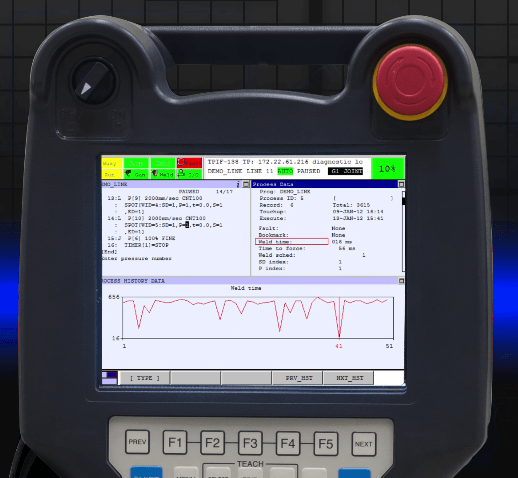
Reliability and user-friendliness is a vital part of supplying the best possible system to our customer. We work with a team to layout the HMI to make it easy for operators to find information about the system when they need it.
MCRI uses a three-part debug methodology to ensure the correct operation of the system prior to the acceptance run.
The first phase (Debug I)
- An individual station quality check and process run, which includes verification of alignment, correct wiring, and station sequence, and correct function of the station’s intended operation without regard to cycle time.
The second phase (Debug II)
- Ensures that all stations can meet cycle time on an individual basis. A minimum of 50 consecutive parts (or other selected number based on system cycle time and part cost) are run on each station without a reject or failure to verify the cycle time and correct operation.
The final debug phase (Debug III)
- Verifies entire system performance at cycle rate, including any trafficking, data handling, etc.
Upon completion of the above debug process, we also dry cycle the equipment for four hours to ensure that cables, hoses, etc. are routed to withstand long-term use and that all adjustments are maintained. At this point, the equipment is ready for your acceptance run.
Acceptance Testing Procedure
Before we tear down the system for delivery to the customer there is a Factory Acceptance Testing (FAT) at MCRI where a system run will prove the agreed upon system capabilities and rates.
Robot System Installation and Commissioning
The installation of your robot system at your facility requires a clear understanding of what MCRI will be providing and what you should be able to provide. Below is a list of items required for the installation of your system:

- Any civil engineering or foundation, wall, or ceiling calculations required.
- Loading, unloading, and transporting of equipment from the truck to the installation site.
- Holes in floors, walls, and ceilings (if necessary)
- Air and electrical hook-ups, motor starters, disconnects, and control panels.
- Any required local permits, approvals, certifications, or inspections.
- Removing and disposing of existing equipment.
- Discarding waste materials generated during installation.
- The overall effectiveness and efficiency of the operating environment where the equipment will function.
- Cooperation of your personnel and other hired contractors, suppliers, and service providers.
Site Acceptance Testing (SAT) at Customer Facility
- MCRI will duplicate the above FAT test on your floor to achieve the SAT to demonstrate the agreed upon system capabilities and rates once installed at your facility.
Robot System Maintenance and Support
Once the system is installed, we have a 24/7 customer service line for troubleshooting issues and scheduling maintenance. With a 24hr service line, you can rest assured MCRI will be there to provide service and support now and in the future. Motion Controls Robotics sticks with you to make sure you are comfortable operating the robot system.
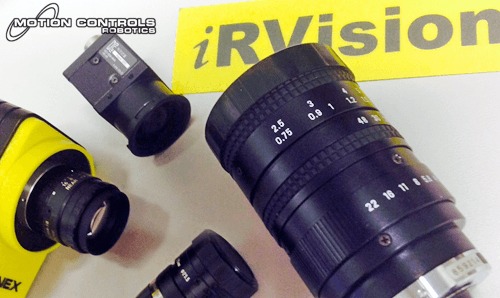
We also offer:
- More in-depth & FANUC Authorized training
- System warranty
- Preventative maintenance packages
- Discounts on spare parts
These Robot Integration Services, combined with the fact MCRI is a financially strong and stable partner with over 22 years of enduring market fluctuations and still providing the same level of service and quality, makes us a reliable option when selecting a robot integrator.

